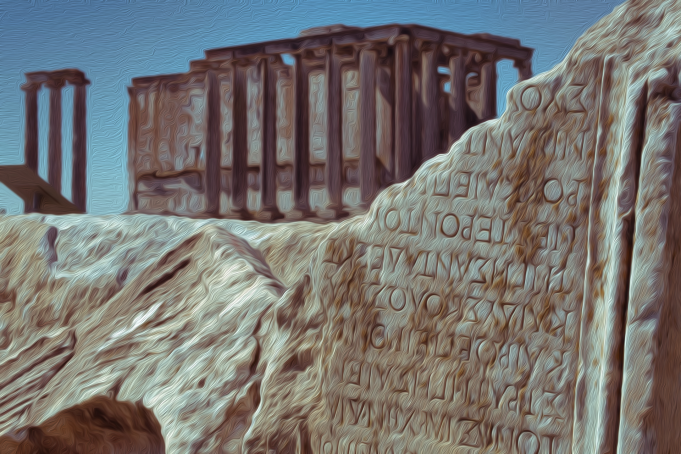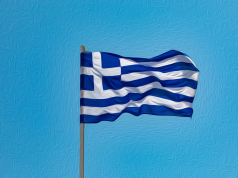Today, at least 13.5 million people speak Greek. The countries where Greek is spoken include Greece, Albania, Cyprus, Turkey, and other countries of the Greek diaspora.
The Greece language has a very long history, dating back to 3,400 years of written records. This shows that the language has the longest documented history among other Indo-European languages.
The language also has a unique Greek alphabet. The alphabet dates back to the 9th century B.C. The Greek language occurred through the modification of the Phoenician alphabet. Some letters were also adopted and innovated for vowels. There are 24 letters in the Greek alphabet. Each of them has an uppercase and lowercase form.
Along with Latin, the Greece language is also the predominant source of international scientific vocabulary.

Greek Language History
In the Mediterranean during antiquity, Greek was the lingua franca that was most widely spoken. The oldest written evidence of Greek is a Linear B clay tablet. It was found in Messenia and dates back to between 14502 and 1350 B.C.
In the Byzantine time, the Greek language became the Byzantine Empire’s official language. It later became Medieval Greek.
Today, Greek is the official language of Greece and Cyprus. Also, It’s one of the 24 official languages of the EU.
Periods of the Greek Language
In the list below, you can find the name of the periods where the Greek language is typically divided into.
- Proto-Greek: It’s assumed as the last ancestor of all varieties of Greek. It’s also considered to have ended in the Neolithic or Bronze Age when Hellenic migrants came to the Greek peninsula.
- Mycenaean Greek: Mycenaean civilization used to speak this language. Mycenaean Greek was found to have been recorded in the Linear B script. The script was on tablets dating from the 15th century B.C. onwards.
- Ancient Greek: It had various dialects, including in the Archaic and Classical periods of the ancient Greek civilization. Ancient Greek was also popular throughout the Roman Empire. It lost its popularity in the Middle Ages in western Europe. However, it maintained its existence in the Byzantine world. It again became popular after the fall of Constantinople and Greek migration to western Europe.
- Koine Greek: This is another name for Hellenistic Greek. It’s also called “Biblical Greek” and “New Testament Greek” by Christian scholars. Great changes occurred in the language after the conquests of Alexander the Great in around 336-323 B.C. It also became a lingua franca from Eastern Mediterranean to the Near East at that time. The Koine Greek also carried some changes in the language that were maintained into Modern Greek.
- Medieval Greek: It’s also called Byzantine Greek. It existed until the fall of the Byzantine Empire in the 15th century. It included different writing and speech styles, including continuations of spoken Koine and classical Attic.
- Modern Greek (Neo-Hellenic): It originates from Medieval Greek, and dates back to the 11th century. It includes many dialects apart from Standard Modern Greek.

Ancient Greek
The use of the Ancient Greek language spans the period between 1500 B.C. and 300 B.C.
Roughly, Ancient Greek is divided into the following periods:
- Mycenaean Greek (c. 1400–1200 BC)
- Dark Ages (c. 1200–800 BC)
- Archaic period (c. 800–500 BC), and
- Classical period (c. 500–300 BC).
It was also the language of Homer and of the 5th-century Athenian historians, playwrights, and famous Greek philosophers. The English language also borrowed many words from the Ancient Greek language. Furthermore, it became a subject of study in the Western world following the Renaissance.
From around 300 B.C. onward, Koine Greek followed Ancient Greek.
Its dialects included a West group, an Aeolic group, an Arcado-Cypriot group, and an Ionic-Attic group.
Where the Greece Language is Spoken Today
Today, at least 13 million people speak Greek mainly in Greece and Cyprus. There is also a minority in Albania that speaks Greek. A considerable amount of Albania’s population knows basic Greek. This is partly because of Albanian immigration to Greece in the 1980s and 1990s.
There’s also a small community of Greek speakers in Bulgaria, near the Greek-Bulgarian border. Greek-speaking communities in the United States, Canada, Brazil, Russia, the UK, and the EU are also available.
The Relationship Greek to Indo-European Languages
You can find a comparison of the Greek language with other Indo-European languages in terms of certain words.
| Words | Hittite | Sanskrit | Greek | Latin | English | Armenian | Tocharian B | Old Irish | Lithuanian | Albanian |
| “I” | uk | ahám | egó | ego | I | es | aš | |||
| “What?” | kuit | kim | ti | quid | what | z-i | kᵤse | cid | kąs | çë |
| “Mother” | mātṛ | mitéra | mater | mother | mayr | mācer | máthair | motina | ||
| “Three” | teri- | trey | tría | tres | three | yerek’ | trey | trí | trys | tre |
| “One hundred” | satām | ekató | centum | hundred | kante | sét | šimtas |




